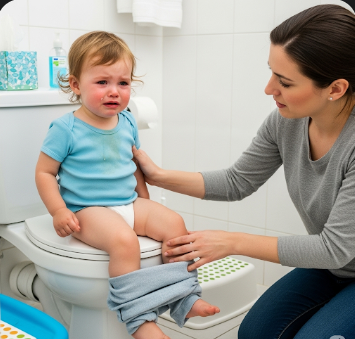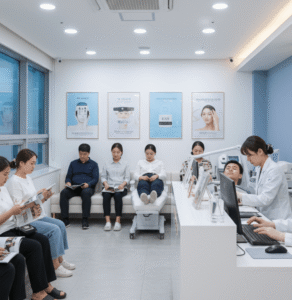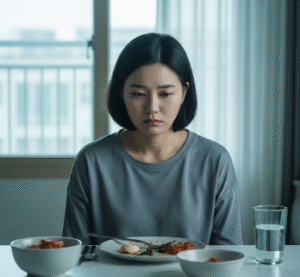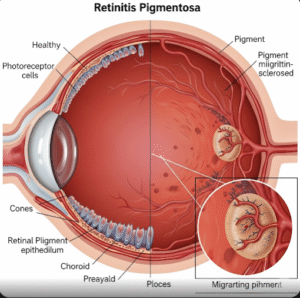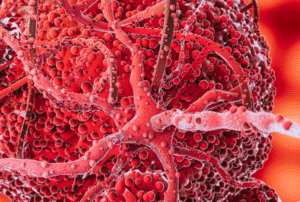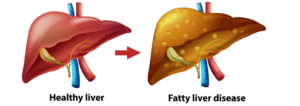Overview
Diarrhoea in children is a common gastrointestinal symptom characterized by frequent, loose, or watery stools, often accompanied by urgency and discomfort. It can range from mild and self-limiting to severe and life-threatening, particularly in infants and young children, due to the risk of dehydration and nutrient loss. In Korea, pediatric hospitals and clinics provide advanced diagnostic evaluations, treatment, and supportive care, ensuring prompt management and prevention of complications.
Key Facts
▶ Prevalence: Diarrhoea is one of the most common illnesses in children worldwide, particularly in children under five years of age.
▶ Causes: Viral infections (rotavirus, adenovirus), bacterial infections (Salmonella, E. coli), food intolerance, antibiotics, or underlying gastrointestinal disorders.
▶ Associated Symptoms: Fever, abdominal cramps, vomiting, dehydration, lethargy, and sometimes blood or mucus in the stool.
▶ Treatment Options in Korea: Oral rehydration solutions, dietary management, medications, and hospital care for severe cases.
▶ Urgency: Persistent, bloody, or high-volume diarrhoea in children requires immediate medical attention to prevent dehydration and complications.
What is Diarrhoea in Children?
Diarrhoea in children is defined as three or more loose or watery stools per day. The condition can be acute, lasting a few days, or chronic, persisting for weeks.
▶ Acute Diarrhoea: Often caused by viral or bacterial infections; typically lasts less than 14 days.
▶ Chronic Diarrhoea: Lasts more than four weeks; may indicate an underlying gastrointestinal disorder such as celiac disease or inflammatory bowel disease.
▶ Secretory Diarrhoea: Caused by excessive fluid secretion in the intestines.
▶ Osmotic Diarrhoea: Results from malabsorption of certain foods or sugars.
▶ Inflammatory Diarrhoea: Associated with infection or inflammation of the intestinal lining.
Note: Identifying the type of diarrhoea is crucial for effective treatment and prevention of dehydration or malnutrition.
What Symptoms Are Related to Diarrhoea in Children?
▶ Frequent Loose or Watery Stools: The hallmark symptom of diarrhoea.
▶ Abdominal Pain or Cramps: Often accompanies bowel movements.
▶ Nausea or Vomiting: Common, especially with viral infections.
▶ Fever: Indicates infection or inflammation.
▶ Blood or Mucus in Stool: Sign of bacterial infection or intestinal inflammation.
▶ Dehydration Signs: Dry mouth, sunken eyes, reduced urine output, lethargy, or irritability.
▶ Loss of Appetite: Children may refuse food or fluids.
▶ Weight Loss: In prolonged or severe cases due to nutrient and fluid loss.
What Causes / Possible Causes
Diarrhoea in children can result from infectious, dietary, or chronic health issues:
▶ Viral Infections: Rotavirus, adenovirus, norovirus, which are the most common causes in infants and young children.
▶ Bacterial Infections: Salmonella, E. coli, Shigella, or Campylobacter.
▶ Parasitic Infections: Giardia lamblia or Cryptosporidium in contaminated water or food.
▶ Food Intolerance or Allergies: Lactose intolerance or sensitivity to specific foods.
▶ Medications: Antibiotics causing disruption of gut flora.
▶ Underlying Medical Conditions: Celiac disease, inflammatory bowel disease, cystic fibrosis, or malabsorption syndromes.
▶ Environmental Factors: Poor hygiene, contaminated food or water, or exposure to infected individuals.
▶ Stress or Emotional Factors: Rare, but functional diarrhoea can occur in older children.
Note: Chronic or recurrent diarrhoea should always be evaluated by a pediatric specialist to rule out serious conditions.
When Should I See a Doctor?
▶ Persistent Diarrhoea: Lasting more than 24–48 hours in infants or more than 3–4 days in older children.
▶ Severe Dehydration: Signs include dry mouth, sunken eyes, lethargy, or reduced urine output.
▶ Blood or Mucus in Stool: May indicate bacterial infection or intestinal inflammation.
▶ High Fever: Above 38.5°C (101.3°F) with diarrhoea.
▶ Severe Abdominal Pain: Persistent or worsening pain.
▶ Infants and Young Children: Higher risk of dehydration and complications; prompt evaluation required.
▶ Underlying Health Conditions: Children with chronic illnesses, immune compromise, or malnutrition.
▶ Failure to Improve: No improvement with oral rehydration or home care within 24–48 hours.
Tip: Pediatricians in Korea provide rapid evaluation, laboratory testing, and treatment plans for diarrhoea in children, ensuring safe and effective management.
Care and Treatment
Management of diarrhoea in children focuses on hydration, nutrition, and treating the underlying cause:
▶ Oral Rehydration Solutions (ORS): To replace fluids and electrolytes lost through diarrhoea.
▶ Dietary Adjustments: Continue breastfeeding for infants; provide bland foods for older children.
▶ Medications: Antibiotics only if bacterial infection is confirmed; anti-diarrhoeal medications are rarely used in children.
▶ Probiotics: May help restore healthy gut bacteria.
▶ Monitoring: Track stool frequency, hydration status, and overall wellbeing.
▶ Hospitalization: Required for severe dehydration, persistent vomiting, or underlying medical complications.
▶ Preventive Measures: Hand hygiene, safe food and water, vaccination (e.g., rotavirus), and proper sanitation.
Treatment Options in Korea
Medical Evaluation:
▶ Stool Analysis: Detect infection, blood, or inflammation.
▶ Blood Tests: Check hydration status, electrolyte balance, and infection markers.
▶ Imaging: Ultrasound or X-ray if structural intestinal problems are suspected.
▶ Specialist Consultation: Pediatric gastroenterologists manage chronic, recurrent, or severe cases.
Advanced Therapies:
▶ IV Fluids and Electrolytes: For severe dehydration or inability to tolerate oral fluids.
▶ Targeted Medications: Antibiotics or antiparasitics based on identified pathogens.
▶ Nutritional Support: Diet plans and supplements for chronic or malnourished children.
▶ Multidisciplinary Care: Pediatricians, gastroenterologists, nutritionists, and nurses collaborate for comprehensive care.
Rehabilitation & Support:
▶ Parent Education: Guidance on home care, hydration, dietary management, and symptom monitoring.
▶ Follow-Up Care: Regular monitoring for chronic or recurrent diarrhoea.
▶ Specialist Clinics: Korean pediatric hospitals offer integrated care combining diagnostic, therapeutic, and preventive strategies.
Outcome: With early diagnosis and comprehensive treatment in Korea, diarrhoea in children can be managed effectively, preventing dehydration, improving gut health, and ensuring healthy growth and development.

